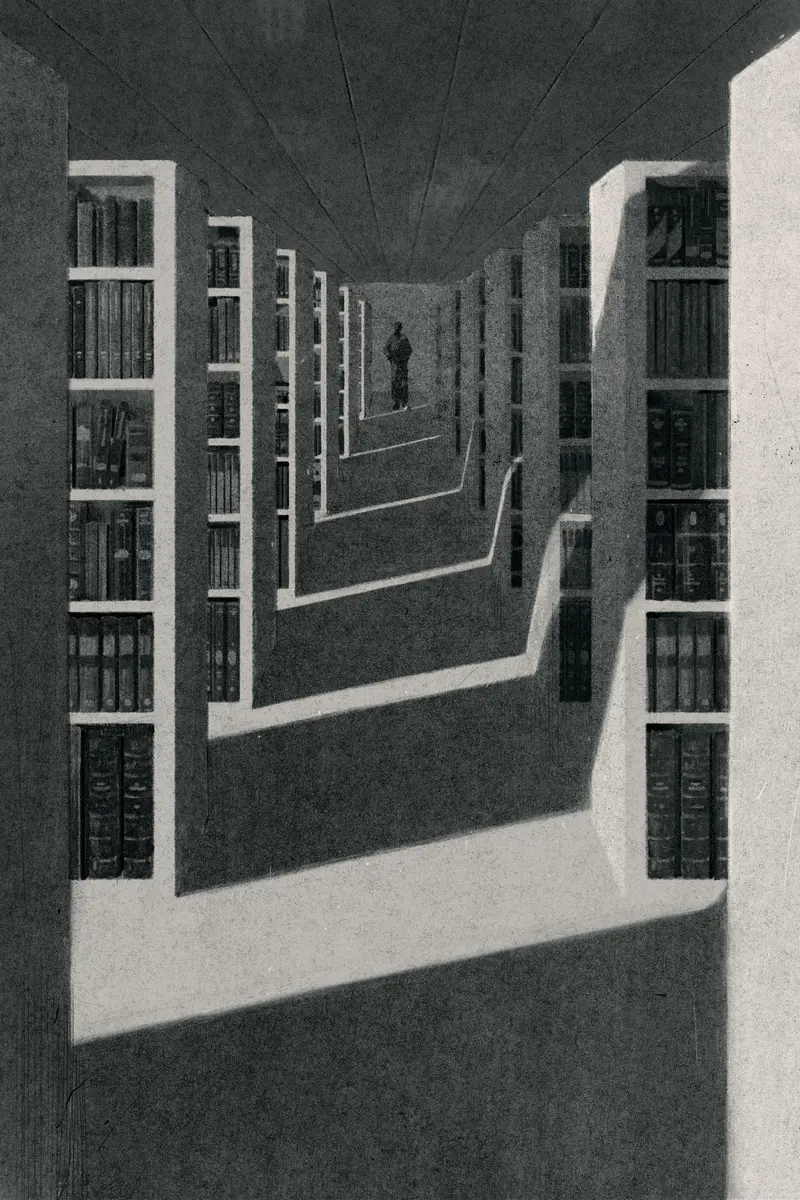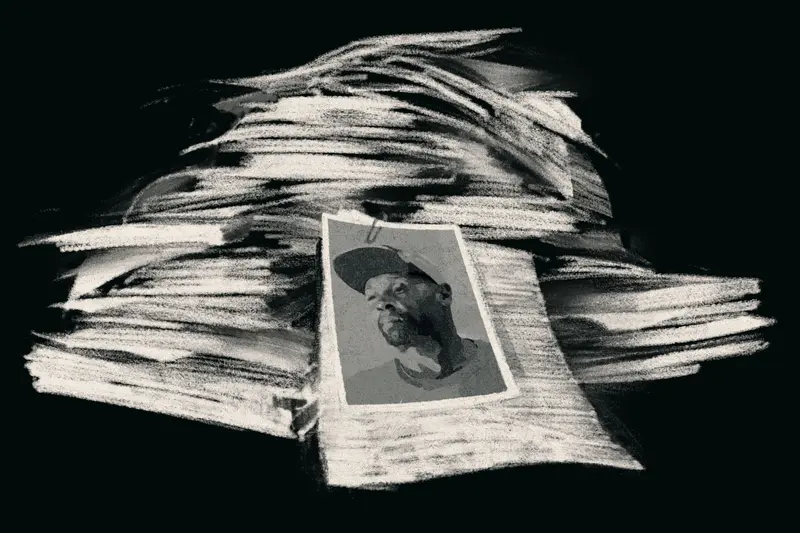Richard A. Webster contributed reporting. Art direction by Alex Bandoni and Lisa Larson-Walker. Development by Jason Kao.
The Scandal That Never Happened
Conservative activist Leonard Leo helped elect a judge in Wisconsin. Without him, the GOP feared their agenda would be “toast,” according to an email.
Two years into his 25-year sentence for attempted aggravated rape, Nathan Brown could tell the man sitting across from him — a jailhouse lawyer improbably named Lawyer Winfield — was not going to help him get out of prison. It was astounding to Brown that he was pinning his hopes on a fellow inmate who had an eighth grade education and whose formal legal training amounted to a prison paralegal course. “But he knew more than I did,” Brown said.
Brown laid out for Winfield the details of his case. In the summer of 1997, a woman was assaulted in the courtyard of the apartment complex in Jefferson Parish, Louisiana, where Brown was living with his mother. The woman, who was white, fended off the attacker with her high-heeled shoe until he fled on a bicycle. When sheriff’s deputies arrived, a security guard suggested they question Brown — one of the few Black tenants in the complex.
Brown, 23 at the time, was in his pajamas, rocking his baby daughter to sleep. The deputies put him in handcuffs and brought him to the victim. When she couldn’t identify him, the officers allowed her to get close enough to smell him. She had told them her attacker had a foul body odor. Brown, she would later testify, smelled like soap; he must have showered immediately after, she speculated. In a trial that lasted one day, the jury found him guilty. After his appeal was rejected, he no longer had a right to an attorney provided by the state.
Winfield began translating Brown’s grievances into a legal petition. He argued that Brown’s lawyer had provided ineffective counsel: He had overlooked the most basic defense strategies, failing to challenge the discrepancies in the victim’s story and to insist on DNA testing. The two of them worked on the petition for months, so Brown was surprised when the Louisiana 5th Circuit Court of Appeal delivered a rejection just a week later. The denial — a single sentence that didn’t address any of Brown’s claims — bore the names of three judges. But something didn’t feel right. How could they return the ruling so quickly? Why was it so vague?
The answer to those questions would come years later, in the suicide note of a high-level court employee who disclosed that the judges of the 5th Circuit had decided, in secret, to ignore the petitions of prisoners who could not afford an attorney. It was a shocking revelation. In a state where police and prosecutorial misconduct frequently make national headlines and a stream of exonerations has revealed a criminal justice system still functioning in the shadow of slavery and Jim Crow, a group of white judges had decided that the claims of hundreds, perhaps thousands, of inmates — most of them Black — were not worth taking the time to read.
Among those petitions was Brown’s claim that a DNA test would have proven his innocence.

On a warm Monday morning in May 2007, as the secretaries and clerks began filing through the glass doors of the Louisiana 5th Circuit Court of Appeal, staff director Jerrold Peterson was inside his office with a 9 mm Beretta pistol. A letter he had written to the court’s eight judges was making its way to the chambers of Chief Judge Edward Dufresne Jr. Versions of that letter were en route to the Judiciary Commission, the panel responsible for investigating allegations of judicial misconduct, and to the Times-Picayune, the state’s most influential paper.
Peterson hoped the letter would unleash a massive scandal — one that he had helped perpetuate for more than a decade. Fifty-five years old, Peterson had long been a fixture at the courthouse, and he reminded the judges that he had kept their secrets, clearing contempt charges against their friends and fixing traffic tickets whenever they asked. But he focused his rage on one secret in particular: their handling of appeals sent to the court by prisoners who claimed they’d been unjustly convicted.
Louisiana requires that a panel of three judges review all such petitions — known as pro se petitions, a Latin phrase that means “for oneself.” But Peterson wrote that the judges had instructed him to ignore the law and dispose of the appeals on his own. Defresne, he explained, signed off on the documents “without so much as a glance.”
The implications were staggering. Over 12 years, the 5th Circuit, which is responsible for reviewing challenges from trial courts in four parishes, had disregarded at least 5,000 pro se petitions from Louisiana prisoners, according to the court’s records. The inmates ranged from people convicted of murder to nonviolent offenders sent away for life. Many had limited education and struggled to present their arguments in the language of the courts. If Peterson’s accusations were true, none of the judges had ever laid eyes on their claims.
Peterson, who was known to keep his door open, didn’t answer the business services manager when she came by to tell him that Dufresne wanted to see him. The chief judge instructed her to have the head of security unlock the door. As he slid in his passkey, the sound of a gunshot echoed through the building.
A police detective arrived at the courthouse and found Peterson at his desk, slumped to one side, the Beretta still clutched in his right hand. The rest of the office, the detective wrote in his incident report, “seemed to be void of any further evidence.” When the officer searched the room a second time “for a final attempt to locate a possible suicide note,” Dufresne joined him. The chief judge didn’t mention that he had already read Peterson’s suicide letter. The detective, though, sensed something was amiss. In his report, he noted that Dufresne “appeared to be evasive.”
The 5th Circuit courthouse sits on the edge of downtown Gretna, a sleepy New Orleans suburb of 17,000 that serves as the government seat for Jefferson Parish. A tight bend in the Mississippi River separates Gretna from New Orleans, but politically and socially, the two are much further apart. Connecting the cities are twin bridges that became notorious after Hurricane Katrina when thousands of New Orleans residents tried to evacuate over the span but were forced back by a line of Gretna police officers. For many Black people in Louisiana, the moment encapsulated the hostility of the suburb, an area shaped by white families who had fled school desegregation half a century earlier.
On the Gretna side of the bridge, the road becomes the Harry Lee Expressway, named for a sheriff of the parish who was elected in 1979 and returned to office six times on a platform of aggressive policing. Lee once proudly announced that he had ordered his deputies to stop any “young blacks” they might find driving at night in a white neighborhood. “There’s a pretty good chance they’re up to no good,” he explained. During Lee’s tenure, the voters of Jefferson Parish sent David Duke, the former grand wizard of the Ku Klux Klan, to the Louisiana House of Representatives for a term.
Dufresne’s ancestors were among the area’s early settlers. His father, a plantation owner known as Big Eddie, built a white-columned brick home at the edge of his sugarcane fields in the neighboring parish of St. Charles. Dufresne, known as “Little Eddie,” launched his first campaign — a successful run for clerk of court — while he was still in law school. After he won a seat on the court, a local publication called him “the Thomas Jefferson of St. Charles government” and asked, “Can Eddie Dufresne, Jr. go cold turkey on politics now that he’s a judge?” The answer was no. By the time he was elected to the newly formed 5th Circuit Court in 1982, he had become a power broker like his father, weighing in on disputes and promoting politicians he favored. Each spring, he hosted a lavish crawfish boil on the riverfront that drew sheriffs, businesspeople, judges and public officials.
Long before he became chief judge in 2001, Dufresne dominated the 5th Circuit. On most weekdays, he would arrive at the courthouse in the passenger seat of one of his Cadillacs, driven by his longtime secretary, who would pick him up at the plantation house. Yet he was perceived by many as a “real salt-of-the-earth kind of guy,” as one lawyer put it. He earned the loyalty of staff by keeping work hours short — he would often leave at 2 p.m. — and wages high. “Dufresne ran a court for the benefit of the judges,” another lawyer told me.
During a monthly meeting of the 5th Circuit’s judges in 1994, he proposed changing how the court handled criminal pro se petitions, also known as writs. The minutes note the proposal but only in passing; it’s sandwiched between a lengthy debate over plans to upgrade the court’s computer system and a discussion about renting a new office copier. Dufresne’s plan is described in two sentences: A three-judge panel would no longer rule on the petitions unless they were “special or unusual”; instead, Dufresne would oversee them himself.
“Administratively, it got somewhat cumbersome to have to select three-judge panels for every writ, because you’d get hundreds of them,” said Bryan Pedeaux, who was Dufresne’s longtime law clerk. “So Dufresne said, ‘Let’s see if we can somehow streamline the situation.’”
At the time, the 5th Circuit had the lowest caseload — and the lowest number of pro se petitions — of the state’s five appellate courts. In the year preceding the meeting, it reported 235 criminal pro se petitions, fewer than one-tenth of the statewide total. The 4th Circuit, which includes New Orleans, reported 1,031.
Dufresne’s proposal was in keeping with his judicial views, former staff members told me. He believed that people convicted of crimes were almost certainly guilty and that any issue they raised on appeal was an attempt to avoid paying for their actions. He almost never reversed a decision of the lower criminal courts. “There was a total prejudice against all people charged and convicted of crimes,” said a former law clerk. “They never planned to give any of these people any relief anyway, so what difference does it make?”
The minutes give no hint of why the judges believed they could circumvent the state’s law. Although Peterson attended the meeting, his future role in drafting rulings on the court’s behalf is not mentioned. Still, it was clear Dufresne was offering to substantially reduce the judges’ caseloads: At the time of that meeting, more than 75% of the court’s post-conviction petitions came from prisoners without an attorney. The change went into effect immediately.
ProPublica made multiple attempts to contact each of the three 5th Circuit judges who presided during the relevant years and are still alive. ProPublica also asked for comment from the 5th Circuit courthouse. None responded.

Entrusted with overseeing the new protocol, Peterson developed a system to dispense with the prisoners’ applications speedily. He drew up 15 rulings for his assistant to cut and paste; they were typically no longer than one or two sentences and ambiguous enough to fit a wide range of claims. A couple of the rulings were labeled “grants” but did little more than allow prisoners access to their trial transcripts.
Sixty years ago, the U.S. Supreme Court ruled in Gideon v. Wainwright that the Sixth Amendment guarantees all criminal defendants the right to an attorney. But in most states, including Louisiana, that right ends after an appeal of the initial conviction. Every subsequent appeal is part of the post-conviction process, an area of law that even experienced lawyers find challenging.
Judges often view pro se appeals skeptically because they are filed by people who are not only untrained in the law but sometimes barely literate. Even liberal courts struggle with the high volume of petitions that lack merit. They are frequently assigned to clerks, who tend to recommend that judges dismiss them on technical grounds to avoid having to unravel what they see as frivolous or poorly made arguments. Still, the post-conviction process is essentially the only avenue prisoners have to introduce new evidence of their innocence or to persuade the court a defense attorney didn’t do their job.
There is overwhelming evidence that state courts routinely send innocent men and women to prison. Researchers estimate that at least 1% of those serving time for violent offenses have been wrongfully convicted — roughly 7,000 inmates in state prisons alone — though they believe that number is much higher. Louisiana law says that people sentenced to death are entitled to court-appointed lawyers for all of their appeals. Subjected to such scrutiny, an astounding number of the state’s prosecutions have fallen apart. Since 1976, 82% of Louisiana’s death sentences have been overturned by appeals judges after defense attorneys exposed serious violations that occurred at trial. Most sentences were reduced to life; some prisoners were exonerated.
That statistic underscores a fundamental inequity. The people sentenced to lengthy or life sentences were arrested by the same police forces, prosecuted by the same district attorneys, represented by the same public defenders and convicted in the same courts as those on death row, but they are on their own. When they file a pro se petition asking Louisiana’s appellate courts to reconsider their cases, they are at a significant disadvantage. Those petitioning the 5th Circuit after that meeting in 1994 had no chance at all.
To create the appearance of a proper review, former staffers said Dufresne formed a “pro se committee,” which included three judges who agreed to lend their names to Peterson’s rulings. Whenever a judge on the committee retired, Dufresne appointed someone new. The nature of the pro se committee was an open secret at the courthouse. “I knew what they were doing, and I knew it was unconstitutional,” said one former clerk. “Everyone knew about it.”
In Louisiana, courts charge prisoners a fee for petitions — generally $50. Those costs are usually paid by parishes in which the defendants are convicted. By 1999, the 5th Circuit was charging $300. The money, paid by taxpayers, flowed into the 5th Circuit’s discretionary fund. In a period when the state’s criminal justice system was close to financial collapse, with some public defenders representing as many as 400 people at a time, records show that the 5th Circuit collected at least $1.7 million for the pro se petitions its judges did not read. Former 5th Circuit employees told me the judges spent the money on office furnishings, travel allowances — even for retired judges — and other perks the state didn’t cover. When asked about the fund’s expenditures, the 5th Circuit said it keeps financial records for only three years and could not provide an accounting.
The pro se petitions made up only a small part of Peterson’s responsibilities. His primary task was to oversee the court’s central staff, a group of lawyers who reviewed criminal petitions filed by attorneys and wrote recommendations for the judges. He also spearheaded the court’s lobbying of the state legislature and oversaw the construction of the new court building. “He loved that job more than anything in the world,” a former colleague told me.
Although Peterson often put in long days, he advised his staff to spend more time with their families. Those who knew him well said his devotion to his work seemed to rise and fall in proportion to what was occurring in his personal life, which was in a perpetual state of flux. Former colleagues said he was unhappy in his marriage and had several affairs with staff members. At times his home mail was delivered to the office, and some of his co-workers suspected he might sleep there on occasion. Putting his children through parochial school was a financial strain. One of his daughters had died in her teens, and a brother had killed himself. A devout Catholic, Peterson had a hard time reconciling his faith with his troubled marriage and bouts of depression.
Peterson was born into a family of river pilots responsible for guiding ships through the lower Mississippi. It’s one of the most lucrative jobs in the state, with pay frequently exceeding $700,000 a year. Peterson’s grandfather, father and brother all held the job, and two of his sons now do. Peterson took a different path. After he graduated from the U.S. Naval Academy, he attended law school at Tulane University and took a job at a firm in New Orleans. He joined the 5th Circuit at age 37; his time with the court was interrupted only by his military service — as a reserve Marine colonel, he served in both the Afghanistan and Iraq wars.
After years of overseeing the scheme, Peterson sought out Karla Baker, who had worked at the court years earlier and with whom he had been romantically involved. Baker was much younger than Peterson, and their relationship had continued after she left the 5th Circuit and took a job as a defense attorney at a prominent New Orleans firm. Peterson told her he wanted someone else to know what the judges had asked him to do, and he gave her a copy of his list of denials and the minutes from the 1994 meeting. He asked her not to do anything unless she heard from him.
On Saturday, May 19, 2007, two days before his suicide, Peterson received a call from Dufresne, summoning him to the courthouse. When he arrived, Dufresne and two judges were waiting in the conference room, and it quickly became clear they were there to fire him. They had evidence that Peterson had tried to improperly sway a case — that he had directed his staff to write a memo advising the judges to rule in favor of a defendant. Peterson rarely, if ever, recommended relief, even in cases filed by attorneys. But this happened to be a case Baker was defending, and Peterson had intervened.
Some law clerks had reported what they viewed as Peterson’s misconduct to the judges. Dufresne wanted to let it go, but a new judge on the court insisted they launch an investigation, which also revealed that Peterson was having a relationship with one of his subordinates. It had become too much to ignore. After more than a decade of denying the appeals of defendants, he was being fired for trying to aid one.
Peterson was blindsided. He had assumed he had a level of job security commensurate with the amount of dirty work he had done for the court. “Jerry thought he was one of them,” a former colleague told me. “He thought he was unfireable because he knew all the court’s secrets.” Now, some of the same judges who had asked him to break the law were dismissing him for what struck him as comparatively small-scale misconduct.
After the meeting, he sat down and began to write a letter to the judges. “Not one criminal writ application filed by an inmate pro se has been reviewed by a judge on the court,” he wrote. “Who’s integrity is really in question when you have conveniently ignored your duty to review pro se criminal writ applications so you can reduce your workload, present a false picture of the court’s work, and charge large sums for work you haven’t done?”
On the morning of his suicide, Baker said, she received an email from Peterson.” He said by the time he was finished it will be Gretnagate.” But he underestimated the determination of the state’s legal establishment to protect its own.
The Times-Picayune ran a short piece on the suicide a few days later. It described Peterson as a well-liked, reliable employee. A staff member told the paper that Peterson’s problems were personal ones: “As far as anyone knows it has nothing to do with anything here at the court.” The article made no mention of the letter Peterson had sent to the paper.
The Judiciary Commission initiated an investigation into the 5th Circuit. A person familiar with the inquiry told me it focused on Dufresne, but it never became public and never had any consequences. Its findings were sealed and sent to a storage facility that was already filled with the records of other misconduct investigations that are not subject to the state’s public records law.
None of the judges involved in the episode was disciplined. A few months after Peterson’s suicide, the 5th Circuit quietly adopted a new policy for handling pro se petitions: A panel of three randomly selected judges would now review them, as Louisiana law required. No one, however, alerted the men and women whose petitions the court had improperly rejected and who were in prisons across the state.

Karla Baker wanted no part of the mess Peterson had left behind. But she had loved him, despite their complicated relationship, and felt partly responsible for his unraveling. She knew that Peterson had gotten into trouble because he had tried to influence the judges in her case. Although she never asked for him to intervene, she said, she worried her own legal career could be in jeopardy.
More than 16 years after Peterson’s suicide, Baker is still hesitant to talk about what happened, and unsure of how to cast herself in the story. Raised in Louisiana, she graduated from Loyola University New Orleans College of Law and began her career as a staff attorney for the state Supreme Court. When she joined the 5th Circuit as a law clerk in 2002, she was taken with Peterson’s intelligence and kindness. He never spoke down to her, she said, despite her lack of experience. He seemed to know everything about the courthouse, and he was always willing to help. As they became closer, she came to see a dark side. He was deeply unhappy, haunted. “He lived on the edge,” Baker said, but felt powerless to change his own circumstances.
Peterson could have taken his documents to the Innocence Project or another nonprofit dedicated to fighting the injustices of the Louisiana criminal justice system, but those were not his people. So, he had left it to Baker, who had never seen herself as an activist, to bring the scandal to light.
Baker anguished about the matter for months. She was engaged to someone by then and was embarrassed about having had a relationship with a married man. She wanted to put the episode behind her. She said she decided to send an anonymous complaint to the Judiciary Commission, laying out some details of the 5th Circuit’s pro se arrangement. She didn’t know about Peterson’s suicide letter or that he had sent the commission a copy. She waited for something to happen, but nothing did, even after she sent the commission a second letter, this time identifying herself as the one who sent the initial complaint.
Finally, Baker took the documents that Peterson had given her and drove to the Louisiana State Penitentiary at Angola. Roughly 130 miles north of New Orleans, the maximum-security prison sits on a former plantation that covered 18,000 acres and is named for the African country from which many of its enslaved people were taken. That year it housed some 5,200 inmates, most of whom were expected to die at the prison hospice.
Angola was once considered the most violent prison in the United States. Brutal assaults and murders among the inmates were common, and the guards were known for sanctioning a system of inmate rape and sexual slavery. After decades of federal intervention and grudging reforms, the prison has largely shed that reputation. Vocational programs, recreational clubs and a Southern Baptist Bible college that has ordained hundreds of inmates have been credited with reducing the violence. Angola also established one of the best prison law libraries in the United States, a sanctuary of sorts where jailhouse lawyers help other prisoners challenge their convictions and sentences.
After passing through security, Baker asked to see Ted Addison, a former client who could no longer afford her services but with whom she had kept in touch. Addison was halfway through a 20-year sentence for armed robbery. For years he had been petitioning the courts on his own, insisting he had been unfairly convicted.
Baker handed Addison a sheaf of documents, which included the list of canned denials Peterson had developed and the minutes to the 1994 meeting. Addison was stunned. Like many other prisoners, he had spent years trying to get the 5th Circuit to grant him a new hearing. He had filed six pro se petitions, and each had come back almost immediately with a brief rejection.
Addison took the documents to the prison law library. Here, amid the rows of concrete cubicles, they were both a revelation and a confirmation of what the jailhouse lawyers had long suspected. For years inmates had noticed an unusual pattern in denials coming from the 5th Circuit: They would arrive just days after the petitions were filed, a process that usually took months at the state’s other appellate courts, and the perfunctory language never varied, with only the names and dates changing from case to case. Now it all made sense.
The jailhouse lawyers set about alerting the prisoners who had petitioned the 5th Circuit during the relevant years. They believed Peterson’s accusations could revive their cases. Addison felt they were organizing “a movement.” He sent copies of Peterson’s documents to inmate lawyers at the state’s other prisons and introduced Baker to Kerry Myers, editor of Angola’s award-winning prison magazine, The Angolite. Myers had been convicted of killing his wife in 1984 and was serving a life sentence for second-degree murder. He had filed five unsuccessful pro se petitions with the 5th Circuit. “I actually had a lot of hope,” Myers told me. “I said, ‘This thing is going to blow up.’”
With Baker representing them, Addison and Myers filed a joint petition to the Louisiana Supreme Court, demanding an investigation into Peterson’s allegations and new hearings for all of the prisoners whose appeals had been ignored. Within three months, the court received 299 petitions from men and women across the Louisiana prison system, most of them drafted from a form that Baker had provided.
Baker also prodded the Times-Picayune to cover the story. The newspaper’s first article, which focused on the prisoners petitioning the state Supreme Court, quoted the suicide note Peterson had sent the paper more than a year earlier. Baker, who hadn’t known about the letter, filed a public records request to obtain a copy from the Gretna police. The Angolite ran a story as well, calling the 5th Circuit’s pro se system a “simple and lucrative process for disposing of the dispossessed.”

The independent review the inmates were asking for presented a threat to the 5th Circuit. If it showed that judgments were unjust, the appeals court could be exposed to civil lawsuits. If the reviews revealed a wrongful conviction, Dufresne and the other judges could face serious discipline, especially since the state’s laws against judicial misconduct take into account the harm the injustice has caused.
The probability that at least some of the 299 petitions had merit was high. More than 90% of the prisoners came from Jefferson Parish, where prosecutors were known for striking Black men and women from jury pools in felony trials at a rate more than three times as often as their white counterparts. Because the state had long allowed “split jury” convictions requiring only 10 of the 12 jurors to agree, many of the Black defendants whose petitions Peterson rejected were convicted by what amounted to an all-white jury.
The Jefferson Parish district attorney had also made aggressive use of the state’s “Habitual Offender” law, which can turn a two-year sentence into life without parole; almost all of the cases involved Black defendants. Many of the prisoners asking for a review had been sentenced under the law and were serving life sentences for nonviolent offenses like drug possession and “purse snatching.”
Some of the judges who had sent these men and women to prison had gained notoriety a few years before Peterson’s suicide, when an FBI corruption sting revealed they had accepted cash bribes and campaign contributions in exchange for allowing a bail bonds company to dictate the amounts defendants were required to post. The scandal sent two judges to prison and unseated a third.
More than 85% of defendants in the state are considered indigent, meaning they qualify for a public defender when they are prosecuted. Louisiana’s public defender system is widely considered one of the worst in the country. It relies primarily on traffic fines and court fees — an unpredictable source of revenue that has never come close to meeting the need. Offices across the state struggle with caseloads so large that they have no choice but to put defendants on long waitlists, leaving them in jail until an attorney becomes available. Some attorneys have so little time to prepare, they meet their clients for the first time on the day of trial.
The Louisiana Supreme Court did not grant the 299 petitioners an independent review of Peterson’s rulings. Instead, it adopted a plan proposed by Dufresne and the other 5th Circuit judges: Rather than saddle another court, the 5th Circuit offered to reconsider the cases itself. “We are guided in this request by a desire to avoid imposing financial or other burdens on other judges in this state,” the 5th Circuit judges wrote. In October 2008, the Louisiana Supreme Court remanded the 299 petitions to the 5th Circuit. (It did the same with another 155 that came later.) As part of the agreement, the 5th Circuit judges whose names had appeared on the Peterson rulings would not be involved in the “reconsideration” of the cases. New three-judge panels would decide whether the rulings, which their colleagues had never read, were nonetheless fair.
With new documents Baker had obtained through public records requests, including Peterson’s suicide letter and the Gretna police report raising questions about Dufresne’s behavior, Addison and Myers challenged the Supreme Court’s decision. The documents, they wrote, “show that all of the judges of the Fifth Circuit … have an apparent or actual conflict of interest in this matter.”
The Louisiana Supreme Court saw it otherwise, stating that it would not be appropriate to task the other appellate courts with the additional work or to spend $200,000 of the public’s money to pay for retired judges to review the cases. Justice Catherine “Kitty” Kimball wrote that the court could not base its decision on the allegations of a depressed court clerk and an “unsubstantiated” police report about his suicide. “While this may be the fodder of news reports and movies,” she wrote, “it is not, in my view, proper evidence for judicial action.”
While the Judiciary Commission inquiry was going nowhere, the state bar launched its own misconduct investigation — into Baker. The 5th Circuit judges had alerted the Louisiana Attorney Disciplinary Board that Peterson had intervened on her behalf. The following year, she left the defense firm and went into practice for herself, representing drug offenders and pursuing damages in personal injury cases. The bar association kept the case against Baker open for almost a decade before sending her a letter saying it found no evidence of wrongdoing and was dropping the investigation.
It took the 5th Circuit three years to review the pro se petitions of 454 prisoners. The Times-Picayune and other local news outlets had by then dropped the story, so no one was paying attention when the judges found that, aside from a dozen procedural mistakes, Peterson’s cut-and-paste denials had been correct. In one case after another, they wrote, “there was no error in the prior rulings of this court.” The court had investigated itself and found it had done nothing wrong.
Myers’ life sentence was commuted in 2013. Addison served out the remainder of his sentence and was released in 2016.
As for the 5th Circuit judges, they prospered in the years after Peterson’s suicide. Some were picked to serve on the state Supreme Court; others enjoyed successful political careers. Dufresne remained the court’s chief judge until he collapsed in the office of one of his businesses on December 7, 2010. His obituary in the Times-Picayune didn’t mention the pro se scheme. In St. Charles Parish, there’s a Judge Edward Dufresne Parkway, a Dufresne Loop and an Edward Dufresne Community Center, where a life-size bronze statue stands. He is wearing a suit with a lobster pin on his lapel and one of Lady Justice on his tie.

That might have been the end of the story but for an unusual confluence of events that landed a former federal law clerk with an extraordinary resumé in a prison bunk bed next to the last inmate still fighting the 5th Circuit’s sham denials.
On January 2, 2019, Haller Jackson IV walked into Angola to serve out the remainder of a sentence for soliciting sex from a minor. He was 37 years old, 6-foot-4 and weighed 200 pounds, but he carried himself like a man who was doing his best to appear smaller. His right eye was blood red, a reminder of a beating he’d received a few weeks earlier at another prison.
Jackson had begun his sentence in Angola four years earlier. When his legal advocacy on behalf of fellow inmates called attention to, among other things, the prison’s inadequate health care, he was transferred to Dixon Correctional Institute, some 35 miles away. After he was assaulted, Jackson said, his lawyer secured his return to Angola, as long as he promised to refrain from embarrassing the authorities.
Jackson was relieved to be able to resume his work as an inmate lawyer. He had a year and a half left on his sentence, and he wanted to make the most of it. As a registered sex offender, he likely would never be allowed to practice law. While he settled in that first day, a man in the adjacent bunk bed introduced himself. His name was Louie M. Schexnayder Jr., but in Angola everybody called him Schex.
Schexnayder was convicted of murder in 1995. He’d petitioned the 5th Circuit 11 times during the period of Peterson’s blanket denials, raising questions about the competency of his defense attorney and the testimony of a witness who later recanted. After the judges at the 5th Circuit affirmed Peterson’s rulings, Schexnayder hired a lawyer to help him petition the federal courts.
Standing in Schexnayder’s way — and in the way of all the 5th Circuit petitioners who tried to take their cases to federal court — was the Antiterrorism and Effective Death Penalty Act, a federal law signed by President Bill Clinton in 1996, at the height of his efforts to portray himself as a tough-on-crime Democrat. The law, known by its unwieldy initials as AEDPA, has made it all but impossible for federal judges to overturn criminal rulings by state courts.
AEDPA was supposed to help deter domestic terrorism and expedite delays in carrying out capital punishment, but it did neither. The time between sentencing and execution is almost twice as long today as it was 27 years ago, and by most measures domestic terrorism has increased. But the law has significantly undermined habeas corpus, the constitutional safeguard that gives prisoners the right to challenge their incarceration.
One of the act’s toughest restrictions, and the one keeping the Louisiana prisoners from taking their cases to federal court, requires federal judges to defer to state court rulings in all but the narrowest of circumstances. Federal judges can’t step in just because a state court proceeding or ruling violated a prisoner’s rights. They can reverse the state ruling only if it was so wrong that not a single “reasonable jurist” would agree with it. Before AEDPA, federal judges provided a critical safeguard. Unlike state judges, most of whom face reelection and can be loath to reverse convictions for fear of appearing “soft on crime,” they are appointed for life and are theoretically free from political pressure.
Since AEDPA was enacted, state convictions based on the fabricated testimony of jailhouse informants or obtained by prosecutors suppressing or falsifying evidence are routinely upheld. Even in cases in which trial judges adopted the prosecution’s brief as their ruling, typos and all, federal judges have declined to step in. Those who do have been repeatedly slapped down by the Supreme Court in opinions that further narrowed the grounds for federal review. If the better-known 1994 crime bill was intended to lock more people up, AEDPA effectively threw away the key.
While some federal judges have tried to push back against AEDPA’s restrictions, those in Louisiana have applied them with zeal. In case after case, Louisiana’s federal courts have signaled to state court judges that virtually no violation of a prisoner’s constitutional rights is so egregious as to warrant review. Dufresne’s pro se scheme was no exception. When Schexnayder asked a federal district court for a new hearing in light of Peterson’s revelations, the judge cited AEDPA in denying his request, and the federal appellate court affirmed. But on that day in January 2019, when Jackson climbed into the top bunk in the prison dormitory he shared with 85 other men, Schexnayder thought finally he might get the help he needed.
Angola has produced some formidable jailhouse lawyers, but Jackson was unlike any of them. The son of a prominent family in Shreveport, he had studied law at Tulane, graduating first in his class with the highest grade-point average in the school’s history. While also pursuing a doctorate in epidemiology, he served as editor-in-chief of the law review and shattered the school’s record for the number of awards and honors earned by an individual student. The lives of most Angola prisoners were marked by extreme poverty; Jackson had grown up in extraordinary privilege. If he hadn’t been gay, he believes he might have been a frat boy, practicing at the family law firm and going to the Shreveport Club for dinner, just as generations of Haller Jacksons before him had done. Instead, he distanced himself from that lineage. After graduating from law school, he landed several prestigious federal clerkships and focused his efforts on prisoner rights and habeas cases.
But it all came crashing down in 2014, when he was arrested in New Orleans after arranging online with an undercover agent to pay for sex with a 10-year-old boy. By his own account, he had become addicted to alcohol and dependent on methamphetamines. It was a spectacular downfall, and it made headlines in legal publications. Jackson pleaded guilty and asked to be sent to Angola. This was an unusual request. The prison still evokes fear and is generally reserved for people sentenced to more than 40 years. His lawyers were against it, but he insisted. “It’s my drag queen approach to life,” he said. “If you’re going to send me to prison, well, send me to Angola.”
It was also a way for Jackson to derive meaning from the wreckage. Angola is where Louisiana’s injustices intersect most dramatically, and Jackson knew his rare expertise in post-conviction law would be valuable. He had always understood that pro se petitioners got short shrift, but in Angola he was shocked to see how many of the prisoners’ claims had merit and how few managed to receive any attention from the courts.
Shortly after he arrived, Jackson met an inmate convicted of stealing a carpenter’s level. He had been sentenced to life without the possibility of parole under the state’s repeat offender law; his previous crimes included stealing a pack of cigarettes and a lighter and writing two bad checks to Home Depot. The man, Jackson wrote in a petition arguing the sentence was illegal, will die in prison over a “tool with a little bubble in it, worth less than $10.” It was denied. Jackson petitioned the court on behalf of a man who had found evidence of his innocence in a police report the prosecutor had withheld at trial. His request for a new hearing was rejected. As was a filing on behalf of a severely disabled man who was still in prison months after he should have been released, and another for a man who claimed he had lost his vision because of the prison’s neglect.
Almost all of Jackson’s filings speak not just to the particulars of a specific case but to the devastation wrought by the entire Louisiana criminal justice apparatus. The state has more people serving life without parole than Texas, Tennessee, Arkansas, Alabama and Mississippi combined. In a petition to the U.S. Supreme Court for a man serving a life sentence for possession of cocaine, Jackson protested “this destruction of another black family — perhaps a tiny tragedy in the civil rights Chernobyl that has been Louisiana’s war on drugs.” There was no evidence linking the man to the ounce of cocaine found at a relative’s home, he wrote. “And yet here he sits still, sentenced to life without parole on the banks of the Mississippi,” he continued. “As seen from the heavens, the scene on these banks has changed little since 1820.” The petition was denied.
By the time Jackson met Schexnayder, his writing had progressed “from disappointed but fundamentally-confident-in-justice liberal to just this side of burn-the-house-down nutter,” he told me. The indignation he felt over the 5th Circuit’s pro se cases was not because of the court’s obvious indifference to the inmates; this he had come to expect. “It’s that the judges got caught saying they don’t care,” he said. “The poor already knew this and have known it viscerally all their lives — from the way every arm of the state has ever treated them.” But here was a case in which they had irrefutable proof, and still there was no outrage on their behalf. “It was crickets,” he said. “They got caught so, so red-handed, and the response of all the other courts has been a collective shrug.”
Schexnayder, who had a criminal record so long that he would almost certainly have landed in prison for life much sooner had he been Black, could hardly be seen as the face of Louisiana’s criminal justice failures. But of all the 5th Circuit petitioners, Schexnayder was the one who had somehow managed to keep his case alive. Jackson knew that a victory for him could open the door for the others. He began working on a petition to the U.S. Supreme Court, arguing the 5th Circuit’s reconsideration of Peterson’s denials did little more than allow the judges to “whitewash the scandal.”
“Why would the Louisiana 5th Circuit think it could get away with such appalling misconduct?” Jackson wrote. “To this there is an easy, if disturbing, answer: Because it has. And now, the lower federal courts are deferring to that court’s decisions in the affected cases, many involving a sentence to life without parole.”
Jackson realized the case was unlikely to get any attention unless he could line up some outside help. AEDPA had been a particular target of one of his mentors, Alex Kozinski, a federal judge on the 9th U.S. Circuit Court of Appeals for whom Jackson had clerked. Frequently mentioned as a candidate for the U.S. Supreme Court, Kozinski had been one of the country’s most prominent judges, a Reagan appointee known for his cutting and iconoclastic opinions. In a 2015 law review article, he wrote that AEDPA was “a cruel, unjust and unnecessary law that effectively removes federal judges as safeguards against miscarriages of justice.” He called for its repeal.
But like Jackson’s, Kozinski’s career had come to an abrupt end. In 2017, amid multiple accusations of sexual harassment, he left the bench. Within the legal world, especially around issues of criminal justice, however, his opinion still commanded respect, even among some of his accusers. Jackson knew that his involvement could draw attention to Schexnayder’s petition. He called the former judge at his home in California. Kozinski thought the 5th Circuit’s conduct — and the federal courts’ unwillingness to wade into it — might provide a valuable test for AEDPA. The law requires deference to the work of state court judges, but what if those judges hadn’t done the work? Kozinski asked the National Association of Criminal Defense Lawyers to submit a brief in support of Schexnayder’s petition and recruited another former clerk to write it.
In April 2019, the U.S. Supreme Court asked the state of Louisiana to submit a response to Schexnayder’s claims, signaling that someone on the court was interested in considering the case. The justices were initially scheduled to vote in April on whether to grant a full hearing, but they postponed that decision nine times over the next eight months. The delays gave Jackson hope. Maybe one of the justices was working to drum up enough votes to give the case a chance or preparing a powerful dissent from the court’s refusal to hear it.
Instead, on Dec. 9, 2019, the court unanimously rejected the case. Justice Sonia Sotomayor wrote a short opinion, citing technical issues with Schexnayder’s original petition to the Louisiana federal court as her reason for agreeing with her colleagues’ decision. She ended with what seemed like an encouraging note to the prisoners, saying the 5th Circuit’s reconsideration of Peterson’s rulings brings up “serious due process concerns.”
“I expect that lower federal courts will examine the issue of what deference is due to these decisions when it is properly raised,” she wrote.
But the federal courts will not get that chance. The 454 prisoners whose denials the 5th Circuit “reconsidered” have exhausted their appeals and can no longer ask federal judges to weigh in on the 5th Circuit’s conduct. In refusing to hear Schexnayder’s case, the Supreme Court has prevented the episode from being raised in federal court again.
When Jackson found out that Schexnayder’s petition had been rejected, he struggled to articulate his reaction. After a long silence, he said, “Well, they got away with it.”
Since they petitioned the Louisiana Supreme Court, some of the 454 inmates have died in prison. Others have been released after serving their time or have had their sentences reduced as a result of recent criminal justice reforms. But at least 170, including Schexnayder, are still incarcerated. They continue to petition the appellate courts, trying to show new evidence of their innocence or to argue that their sentences should be reduced.
After the Schexnayder episode, Jackson set his sights on the modest goal of filing as many petitions as he could before his release. “I’m going to make them tell me they’re OK with all these crazy cases,” he said. When he walked out the prison gates in June 2020, he smuggled several office boxes containing case files he had secretly copied — documents he would use to help the men he was leaving behind. In the months that followed, Jackson found lawyers to represent dozens of prisoners and worked with legal nonprofits to reduce the sentences of more than 100 people. Among them are several men whose pro se petitions the 5th Circuit had ignored.

In the years that Peterson was rejecting pro se petitions, the 5th Circuit denied claims that ended in at least five exonerations. Four of these men were freed only after the New Orleans Innocence Project agreed to represent them. Nathan Brown was one of them. He had appealed to the organization early in his incarceration, and lawyers there had discovered that the victim’s dress had been preserved as evidence and could be tested for DNA.
Hurricane Katrina put a stop to everything, though, and for a long time Brown heard nothing. While he waited, the 5th Circuit reviewed Peterson’s denial and concluded that the failure of Brown’s attorney to introduce DNA evidence was “within the scope of trial strategy” and did not constitute inadequate counsel.
Then, on his 39th birthday, Brown received a letter from the national Innocence Project, saying it would take his case. Brown’s new lawyers compelled the Jefferson Parish district attorney to send the dress for DNA testing, and the analysis identified another man — a convicted felon — as the attacker. In 2014, after 16 years, 10 months and 18 days, Brown was exonerated.
It’s been nine years since Brown was released, and he’s still trying to find stable ground. He has struggled with addiction and depression. He cycles through phones. He has lost his Social Security card so many times the federal government will no longer replace it. The dreams he had for himself when he was in prison — that he would go to college, that he would help his daughter to rise above the poverty that had plagued his own childhood — have slipped so far out of his reach he can hardly allow himself to believe in them. Still, he knows how exceptional his case is.
“They have a lot of guys in prison that are filing claims,” he told me. “They’re not all saying, ‘I didn’t do this.’ They’re just saying, ‘The way you sentenced me is wrong. The crime doesn’t warrant all this time you gave me.’ But they can’t come home, because once they get you, they got you, and the courts — they’re not listening. They don’t see you.”

ProPublica is a nonprofit newsroom that investigates abuses of power. Sign up to receive our biggest stories as soon as they’re published.
ProPublica is a nonprofit newsroom that investigates abuses of power. Sign up to receive our biggest stories as soon as they’re published.
Richard A. Webster contributed reporting. Art direction by Alex Bandoni and Lisa Larson-Walker. Development by Jason Kao.
Richard A. Webster contributed reporting. Art direction by Alex Bandoni and Lisa Larson-Walker. Development by Jason Kao.






